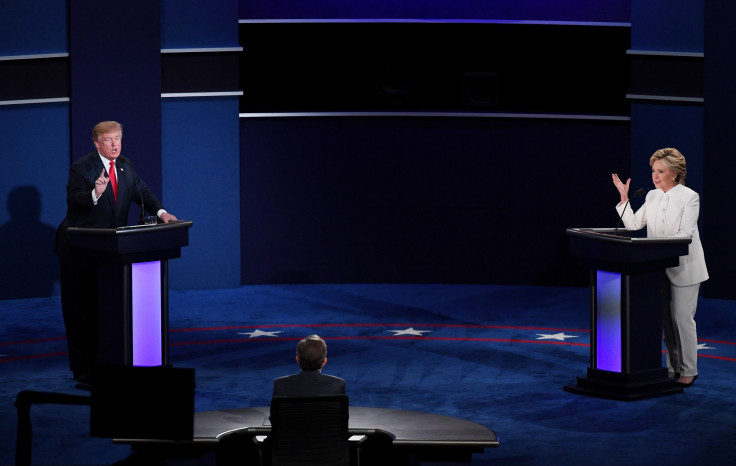Will Trump Accept Election 2016 Results? Candidate Says He 'Will Keep You In Suspense' Until November

Republican presidential candidate Donald Trump, who has recently begun claiming that the upcoming general election is rigged, hinted Wednesday that he might not accept the results when they roll in the night of Nov. 8.
As the debate wound down, moderator Chris Wallace asked Trump to commit to accepting the outcome of the election. The GOP nominee's running mate, Mike Pence, and daughter, Ivanka Trump, have both told reporters this week that he will take the results at face value.
But Trump suggested differently on Wednesday. "I will look at it [the outcome] at the time. I'm not looking at anything now," he said. When Wallace pressed him, Trump repeated himself. "What I'm saying now is I will tell you at the time. I will keep you in suspense, OK?" he added.
Democrat Hillary Clinton called Trump's answer "horrifying." "You know, every time Donald thinks things are not going in his direction, he claims whatever it is is rigged against him," she said.
Clinton then mentioned the race for the Emmy Awards, which Trump has repeatedly complained are unfair because his show "The Apprentice" has not won. "There was even a time when he didn't get an Emmy for his TV program three years in a row and he started tweeting that the Emmys were rigged," she said.
Trump interrupted Clinton with the line: "Should have gotten it."
John Adams accepted peaceful transfer of power in 1800. That's been the standard for 216 years. Now Trump says: "I'll keep you in suspense."
— John Nichols (@NicholsUprising) October 20, 2016
Trump campaign manager Kellyanne Conway told CNN after the debate that he would, in fact, accept the election results — "because he's going to win."
The two candidates prepared for the final presidential debate Wednesday at the University of Nevada in Las Vegas in different ways — Trump, by meeting with supporters on the campaign trail; Clinton, by undergoing nearly a week of intense rehearsals.
The two were close in national polls just 19 days out from the election. Clinton was polling at an average of 48.6 percent to Trump's 42.1 percent, according to RealClear Politics.
"In the past three presidential elections, whoever was winning the polls three weeks out ended up winning the election," analyst Terry Madonna told PennLive.com. "Debates do more to solidify existing support than win new voters."
The Commission on Presidential Debates did not invite Libertarian candidate Gary Johnson or Green Party nominee Jill Stein due to their low poll numbers, but neither politician was taking the night off. Stein announced her plans to simulcast her responses to the debate questions on a Facebook live stream. Johnson was live-tweeting the debate and planned to appear on "Jimmy Kimmel Live!" afterward.
When respondents nationwide are polled about all four candidates, Clinton comes in first with 45.3 percent support, Trump is second with 39.1 percent, Johnson follows with 6.5 percent and Stein trails with 2.5 percent.
© Copyright IBTimes 2024. All rights reserved.






















